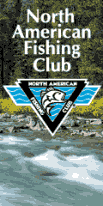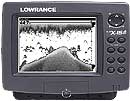













Promotional
Team Favorites
Lodging food and more








|
Big and Bulky for Fall Walleyes
By Sam Anderson
For most anglers, the spring and early summer constitutes the bulk of
the fishing season. Their excitement and motivation runs high before
the "opener," but by the time late August rolls around they are ready to
throw in the towel. And that's to bad because late fall and early
autumn can provide some of the best fishing of the year.
The late summer then, is a time of transition. In the Upper
Midwest, that transition usually occurs toward the end of September or
the beginning of October. The days become noticeably shorter, the
nights cooler and the first hint of fall is in the air. In our natural
lakes, a corresponding process has begun. Weedbeds have begun to
die off, water temperatures are cooler, food production has slowed dramatically
and the little remaining forage is eagerly sought by predators.
Fish activity is also different at this time of year. Largemouth
bass begin to form larger schools and start feeding voraciously.
Northern pike move in from larger schools where they were feeding in deep
open-water locations, and actively cruise weed flats. And walleyes
shake off their summer lethargy and begin to enter shallower feeding waters.
This sets the stage for all kinds of fishing. These fish
are in a process of transition also. These conditions work together
to create one of the year's peak fishing times. It's as if the game
fish suddenly realize the long winter is approaching and know they have
to chow down in preparation for the hard times ahead. The most important
aspect is that all of this will occur before the colors really form on
the trees.
This period is not identifiable with a specific weather occurrence.
This time of the year comes as the trees start to show a sign of ending
of the summer and just before the major frost starts to blanket the ground.
The dramatic changes are going on under water, but on the land the clues
are much more subtle.
The best example of how I stumbled onto this was on a late October
evening. Fishing had been poor for about three weeks and it didn't
seem this evening would be any different than the previous ones.

Lowrance’s
new X-15 |
As I motored across the lake I noticed from my Lowrance depth finder
that the water temperature had fallen from the low 60's to the mid 50's.
I didn't give it much thought, but what I didn't realize is that this was
enough to start the fish on their fall transitional patterns. |

Lindy's
Fuzzy Grubs |
I motored over to a small point where I had caught a few walleyes during
the summer months and I cast out my 1/8 Lindy Fuzzy Grub jig tipped with
a minnow. |
As the splash subsided I felt that familiar tug on the line and I quickly
set the hook. I reeled in a nice two pound walleye. Since the
fishing hadn't been fast and furious over the last two weeks and the family
was interested in eating a few fish before winter set in I decided to keep
this walleye. I unhooked the walleye and put him in my livewell.
I hooked up the minnow again, because it wasn't too badly destroyed and
cast to the exact same spot. Just like the first cast as the splash
subsided I hooked another walleye.
In the next fifteen minutes I caught 10 walleyes in this exact
same spot releasing all but four for dinner. These fish were aggressive,
if one walleye got off another latched onto the bait and I used the same
minnow two or three times. It really didn't seem to matter
what condition the minnow was in; they just kept hammering the jig and
minnow combination. The key here is I added bulk and live bait to
my jig approach.
The subtle difference was the water temperature and the structure
that they related to. The fish congregated in this area to feed and
fatten up for the beginning of the autumn season. They came together
to hunt in schools and possibly to move into deeper water as the season
started to progress.
Just because this time of year offers excellent fishing, that
doesn't mean you're going to succeed every time. First of all you
have to find the fish.
The shape of your bait might be determined by the type of fish that
you are trying to catch. If you are fishing for bass you will want
a short or fat bait like a Fat Rap. The reason is the bass usually
feed on shad or even bluegills that are short and fat.

Original Rapala |
The shape of the fish that you are catching dictates the shape you
need to offer in a lure form. For example the long slim baits such
as the Shad Rap or the Floating Rapala are ideal for long slim fish.
Walleyes, Northern Pike and Muskies are attracted to this type of bait. |
Sound is another sense that the fish use to locate and identify food.
Water conditions and specie of fish will determine the sounds that you
would like to imitate. All fish have an organ along the side of their
heads and bodies called a lateral line that enables them to detect subtle
vibrations in the water. If you are fishing for bass or northern
pike a noisy lure is the answer. Likewise, if you are fishing in
stained water then you want the walleye to be able to hear your bait.
Rattling Rapalas are a good example of a noisy bait that will take a variety
of fish under these conditions. If you are fishing in a clear lake
quiet baits that produce wobble and vibration are what you want to use.
For northern pike I troll and cast crankbaits across the shallows
on the flats. Again I want to cover water quickly looking for the
active fish, so I will use a #7 Shad Rap or a shallow running Husky Minnow.
I check the drop off areas and cruise the flats using a zigzag pattern.
For walleyes I switch from the traditional night crawler to a
jig and minnow combination. The minnows are not as plentiful during
this period of time so the walleyes tend to go after this offering.
I might also use a shallow running Rapala in the shallows by long lining
them across the flats.
Walleyes will frequently spread out over shallow flats or on points.
When they do so, try front-trolling at a fairly quick clip. Tie on
a jig and plastic trailer heavy enough to stay near the bottom as the boat
moves along. As the trolling pass is made, sweep the rod so the bait
jumps, then falls back to the bottom. A six foot medium heavy action
spinning rod with eight to ten pound test XT line will be about right.
At times, walleyes can be found over the tops of cabbage weeds,
especially during low-light periods. At other times they'll suspend
along the deep edge of the cabbage. These are the times when eighth
ounce heads come into play. Especially the bullet shaped heads, because
they tend to slide through the weeds and can be ripped when they become
stuck, triggering a strike from a fish. Swim the jig and the tail
combo over the tops of the weeds, then let it fall along the deep edge.
This technique can be very productive.
Plastic lures are another way to bulk up your offering, and they
play an important part in three way rigging on rivers. The common three
way or Wolf River rig is one of the oldest and most effective means of
keeping a bait near the bottom while trolling upstream. Comprised
of six pound test XT main line and leader, a small three way swivel, a
lead sinker and an assortment of super sharp hooks, upstream rigging is
very popular on large rivers like the Mississippi, Illinois, St. Croix,
and Missouri.
Plastic grubs or Power Baits can also be easily added to a Wolf
River rig. I prefer to add the smaller panfish style curly tail grubs to
floating jig heads to give them more action and added color. Dressing
up a #1 or #2 Aberdeen worm hook with a three or four-inch twister tail
is another excellent way to add plastic to your 3-way rig.

Berkley
Power Grub |
Power Grubs and Power Worms, especially the “ Tournament Strength”
are good examples of plastic baits with action tails that are extremely
productive. The three and four inch sizes are the best for walleyes,
although two inch Grubs can be good with fish that are finicky. |
Go with the larger baits when a slow fall is desired or when the walleyes
are active.With the cool weather and the beginning of school, we all know
that fall is not far behind. The leaves are beginning to turn colors
and the birds and ducks are on the wing. The call of the fields and
the woods are sirens to many an outdoorsman.
The angling pressure is no longer present and the fish must feed
in order to store fat for the winter. The boat should remain out
and ready for the warm, "Indian summer days" to come.
If you add that extra bulk or make the wobble a little larger
the walleyes have to attack your offer. If you want to talk more
about this technique or other fall fish strategies then contact me on the
web at www.samanderson.com.

Fish
Clix Banner Exchange
Walleyes Inc. website is maintained
by Randy
Tyler Fishing the In-Fisherman Professional Walleye Circuit, Masters
Walleye Circuit and the Team Walleye Circuit. All rights reserved.Copyright
1999/2002
Please visit these site sponsors
Daiichi/Tru-Turn Hooks,
Lindy
Little Joe,
R-A.M Mounting Systems,
Ranger
boats, Mercury Outboards,
Bedford
Sales , Church Tackle, Panther
Marine Products,
Webfoots body
sock, Bait Rigs Tackle ,Dual
Pro Charging Systems, Daiwa Rods and
Reels, Driftcontrol Wind socks,
Trojan
Batteries
|



